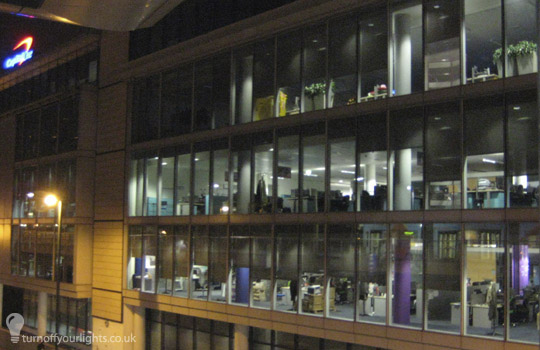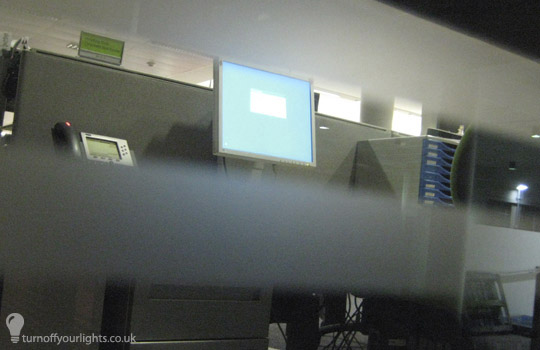Welcome to my new blog: Turn off your lights! I’m currently still working on the design for the main website, but as the blog is finished I decided to start using it.
The main website will give people the opportunity to name and shame businesses and organisations who waste energy by leaving their lights switched on through the night when there is no-one there.
The idea to create the site came last year when I lived near the train station in Nottingham. I would often walk home from town on the weekend in the early hours of the morning past the Capital One offices. I was always surprised by how many lights they had on and no matter how much I looked through the windows I never saw anyone inside!
Nearly a year on, Capital One still leave their lights on! These pictures were taken on Saturday 3rd January, 2008. Admittedly, while I was taking the pictures I did see someone, who looked like a cleaner or security guard, walking around one floor – but even so, that’s a lot of lights switched on for just one person who can only be on one floor at a time!

In kind of a double whammy, I noticed that lots of the computers inside the building were still switched on too! How much power is this (more or less) empty building using?!

More information on Capital One’s attitudes towards Environmental Sustainability can be found on their website: “Every day, we strive to ensure that we operate our business in an environmentally sound and socially responsible manner and seek to raise awareness of sustainability best practices among our shareholders, consumers, associates and suppliers” Really?
If you see any other examples of businesses who are clearly wasting energy then please take a picture and send me photos! All photos can be emailed to: photos@turnoffyourlights.co.uk. If you have any thoughts or suggestions about the site then please get in touch at the same address!





I see loads of companies who leave their lights and computers turned on over night. It’s such a waste!
This is a great idea for a website…
Will be taking my camera out with me from now on to name and shame those companies who don’t take our planet seriously.
Thanks
Idiots!
They should be shamed!
[...] sense and thought to switch appliances and lights off if they are not needed – if only people at Capital One [...]
I have just moved from England, and now relise how much light pollution there is around British cities, as at night here it is black, one street light at road Junctions, and along public footpaths, on roads or seperate.
There are no lights on motorways, or any other road that does not have a footpath (cars and cycles should have lights anyway by law).
Back to the UK.
A thing that was (many years ago) mentioned was that exterior lighting, should not point upwards, and infact street lights are designed not to ‘leak’, and uplighting was to be banned on new developments.
I lived next door to the NRA in Surrey, and their exterior lights were left on all the time to enable them to see any burglars, the problem is that they have no security, so when they had a break in, the burglars could see nice and clearly. Statistics have said that if the building is dark, then a torch, or light comming on is much more likely to be noticed by cctv, or security personell, this conflicts with the ‘secure by design’ policy on planning, which insists on lighting for personal security.
Anyway, when you have the site up and running, you need some serious publicity, so someone like Mark Thomas, might be worth a try as he likes decent causes.
I would like to Name Wembley Stadium, and Ascot, that have on a number of occasions been lit up, in the very small hours of the morning, and they are much bigger in size that one or two office blocks.
Joe Godfrey, enjoying being able to see more than a few stars in the sky.
Additional Info.
Certain lights, sodium (like street lights) use a multiple of the running load at startup, which can last for 30 seconds or so, which means the first thirty seconds, take say three times the light running normally, so for two minutes, it is agruable as to costs, if turned on and off repeatedly.
However there is no excuse for leaving lights on all night, from the end of work (say 6pm), until dusk the next evening (say 4pm in the winter) as they will use 90 seconds worth to turn them back on, rather than over twenty two hours if left on constantly, which completely defeats the purpose of these efficient lights.
Street lights adjacent to rail lines are shroweded in the UK, to aid safety.
Buildings are designed to allow correct light levels, so near a window, has more light than in the centre of a floor, so in theory, perimeter lights should be switched seperately from central, however this never happens.
Lights produce heat, therefor, they need to be factored into HVAC systems, however they are frequently not, which means that aircon systems work harder, therefor less efficiently than they were designed to , and have a shorter working life, thereby cost and environmental impact.
Tourist attractions, need not leave their lights on between 2am and 5 am, as no one ever looks at them, so Parliament for a start is a bad example.
http://www.britastro.org/dark-skies/law.html
A page with a link to the Law on Lights, and Light Polution.
If a premises affects your evryday life, and sleep, or produces excessive light pollution, there is a legal process for dealing with it. Under the 2005 Act.
The “hidden” harm, done by light at night, has been a problem since 1897 -
http://www.lightpollution.org.uk/dwnLoads/NewMissive19Dec2009v4.pdf
Perhaps, like mesothelioma, the harm has been done and cannot now be undone? Time will tell if we are JTL or not. It will be interesting to see what the future features – if we are JTL, then that future will be purely palliative!
Leaving lights on all night is totally wasteful, as is inappropriate lighting such as floodlit buildings, sports lighting and illuminated regeneration follies (i.e. illuminated “art” projects often funded by local councils and regional development agencies). The environmental effects of Light at Night are now well established. The money wasted on excessive lighting would be better spent on health, education and welfare.